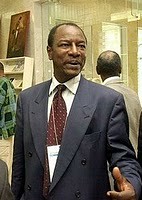
President Alpha Conde of Guinea won the elections in a run-off vote. The country is rich in mineral resources including bauxite and diamonds.
Originally uploaded by Pan-African News Wire File Photos
AFP.
CONAKRY. Guinea waited anxiously yesterday for the Supreme Court to confirm presidential election results, two weeks after violent clashes erupted as opposition leader Alpha Conde was named the winner.
The country has been under a state of emergency imposed on November 17 until the publication of final results, and the legal deadline was yesterday.
Conde was announced the victor of Guinea’s first democratic election since independence on November 15 with 52,5 percent of votes over rival Cellou Dalein Diallo who scored 47,5 percent, sparking accusations of voting fraud.
Diallo has demanded the cancellation of votes from Siguiri and Kouroussa, strongholds of Conde in Upper Guinea where he claims the Malinke ethnic group aligned with his rival, carrying out a violent campaign of "ethnic hatred" against members of his Fulani ethnicity in October.
The electoral commission chairman, Malian General Siaka Sangare, has said he found no evidence of the fraud allegations presented by Diallo.
Conde meanwhile has promised to be "the president of national reconciliation" while saying "people have greatly exaggerated the ethnic problems in Guinea."
The Supreme Court was working in great secrecy yesterday ahead of the expected announcement.
"We are barricaded in, I cannot say anything," one of its members told AFP.
The announcement of provisional results led to three days of violent protests in Diallo’s fiefs.
In Ratoma, a suburb of Conakry, young Fulani erected barricades, lobbed stones at security forces and attacked those suspected of supporting Conde.
At least seven people were killed as security forces cracked down in the violence, to international condemnation of unnecessary brutality.
In Conakry the main hospital recorded 326 people being injured in the clashes, 52 of whom had bullet wounds, a source said.
In Labe in Middle Guinea, at least four women were raped by soldiers, according to testimony gathered by AFP.
Ombudsman Conde Goureissy said he was convinced that both candidates were "concerned about the future of this country" and therefore "the violence recorded in recent times, both in Upper Guinea and Middle Guinea and Conakry, would not happen again."
Aziz Diop, executive secretary of the National Council of Civil Society Organisations of Guinea (CNOSCG) said: "We call upon both candidates to focus on social peace, and we call on their supporters to avoid violence.
Well-known trade unionist Rabiatou Serah Diallo, president of the national transition council, hoped for the Supreme Court to "read the law and nothing but the law and everyone to understand afterwards that there is no appeal." But at the same time, she said she was "disgusted and hurt" by what was happening in the country as well as "the rise of intolerance."
The independent International Crisis Group (ICG) recently denounced "systematic attacks by security forces" against Diallo’s Fulani supporters.
Human Rights Watch also said security forces dominated by ethnic groups supportive of Conde used "excessive force . . . targeting members of the Fulani ethnic group".
On Wednesday night the army announced 26 soldiers had been discharged "for unauthorised shooting, criminal conspiracy, looting, robbery, armed robbery and selling weapons of war before and during the state emergency." — AFP.
No comments:
Post a Comment